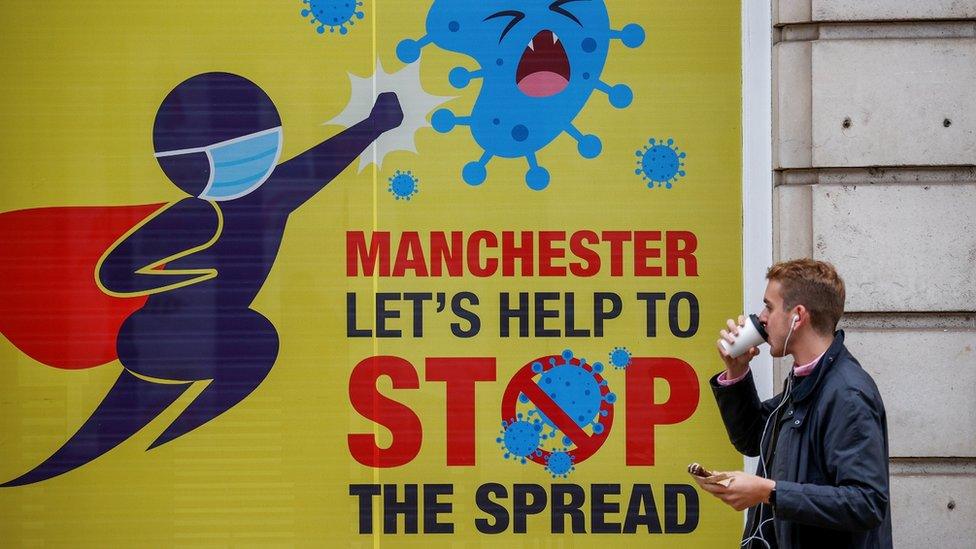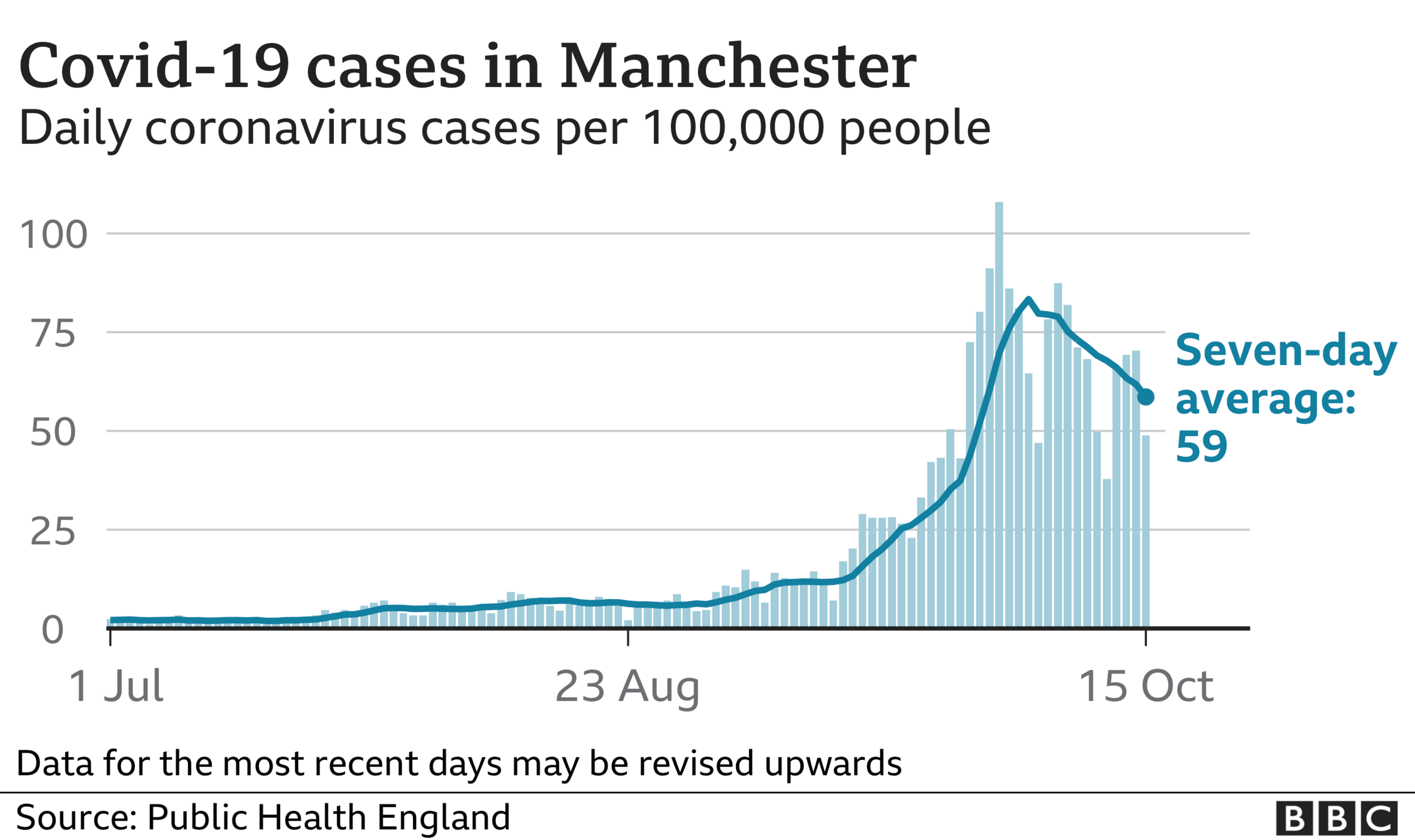Covid: Latest Greater Manchester talks end with no agreement
- Published

A meeting between ministers and local leaders about Greater Manchester's Covid restrictions has ended without agreement.
Local leaders want better financial support for workers before any move to the top tier of rules, which would force some businesses to close.
The communities secretary has said local leaders have a deadline of noon on Tuesday to reach a deal.
It comes as the UK recorded a further 18,804 coronavirus cases and 80 deaths.
Following the meeting, Greater Manchester's Labour Mayor Andy Burnham told the BBC: "The government could have a deal if it better protects low-paid people. It is choosing not to do that."
Prime Minister Boris Johnson said on Friday that he might "need to intervene" if local leaders did not accept a move to tier three - the highest level of England's coronavirus restrictions.
Meanwhile, Health Secretary Matt Hancock told the Commons further discussions were planned with leaders in South Yorkshire, West Yorkshire, Nottinghamshire, north-east England and Teesside about restrictions in these areas.
There are conflicting reports about Monday afternoon's meeting between Communities Secretary Robert Jenrick and local leaders in Greater Manchester, which one source on the call said ended "abruptly".
In a joint statement, Mr Burnham and the Labour leader of Manchester City Council Sir Richard Leese said: "We had been encouraged by earlier discussions at an official level where the idea of a hardship fund, to top up furlough payments and support the self-employed, had been tabled by the government.
"It was both surprising and disappointing when this idea was taken off the table by the secretary of state."
But a spokesperson for the Ministry of Housing Communities and Local Government (MHCLG) said that while it was "disappointing" no agreement had been reached, Mr Burnham was "incorrect in claiming that officials made this proposal today".
A key sticking point of the dispute is that Mr Burnham wants the government to reintroduce the 80% furlough scheme used during the UK's first lockdown, instead of the new Job Support Scheme which covers 67% of the wages of people affected by tier three closures.


This evening, the two sides can't even agree on what they actually discussed earlier.
Believe the local leaders and this morning there seemed to be hope in the air. Officials from central government had mooted the possibility of a hardship fund to help support low-paid workers who stand to lose out if businesses close their doors under tighter restrictions.
The message local leaders took from their meeting was that, while the Treasury is adamant they are not going to extend their national furlough scheme that has supported millions of wages any further - nor increase the level of cash available from its replacement, the Job Support Scheme - Westminster might sign off extra money that could be spent that way, if local politicians saw fit.
There was no concrete agreement on the numbers, but sources in Greater Manchester suggest the cost of supporting those who need the extra help comes in at around £15m a month.
After that call, the consensus among North West leaders was moving in the direction of signing on the dotted line, with another call planned with Communities Secretary Robert Jenrick for the afternoon.
But rather than ushering in a new spirit of co-operation, that meeting went south.

Meanwhile, people in Wales will be told from Friday to stay at home, while pubs, restaurants and non-essential shops will shut, as part of a "short, sharp" national lockdown until 9 November.
It comes as a two-week school closure begins in Northern Ireland as part of a tightening of restrictions.
Scotland continues to draw up plans for a three-tier framework of measures, similar to England's.


The prime minister's official spokesman said that in Greater Manchester the number of new cases in people over the age of 60 had tripled in the most recent 15 days of full data - from 89 cases per 100,000 on 27 September to 282 per 100,000 on 12 October.
He said government projections suggested coronavirus patients would take up the entire current intensive care capacity in Greater Manchester by 8 November, not including capacity in Nightingale hospitals.

However, Prof Jane Eddleston, the region's medical lead for the coronavirus response, said Greater Manchester's intensive care capacity was not at risk of being overwhelmed.
Prof Eddleston said the situation was "serious" but despite the "stark" figures on hospital admissions and cases, extra capacity would be available.
In their joint statement, Mr Burnham and Sir Richard said Greater Manchester's intensive care unit occupancy rate was "not abnormal for this time of year" and it was "essential... public fears are not raised unnecessarily".


There is a blizzard of numbers flying around about Greater Manchester, and the North West more widely, as national and local politicians argue about whether to introduce local restrictions.
But a curious element that seems to have been missed is that the rise in cases may have already stalled.
The last few days show no rise in the average number of new infections across the North West, while Manchester itself may actually be seeing cases fall after peaking at more than 500 a day on average at the end of September.
This will take some time to filter through into hospital cases as the people who are ill enough to be admitted to hospital have been infected a few weeks before.
But already there are signs the rises in hospital admissions are slowing.
That's not to say hospitals and intensive care in particular is not busy. The pressures are akin to what the NHS would normally see in the peak of winter and, of course, it's only October.
But talk of units becoming overwhelmed when they have not even really dipped into their "surge capacity", transforming other parts of the hospital into temporary intensive care wards, seems somewhat premature.
What happens in the coming weeks though will be crucial.

Earlier, Mr Jenrick indicated that Greater Manchester could be offered a financial package similar to the "tens of millions" of pounds of support agreed for Lancashire and the Liverpool City Region, external - the two parts of England already in tier three.
Nottingham's Labour council leader David Mellen has also called for more support for businesses in the city if it is moved to tier three.

WHAT PLANET ARE WE ON: Sir David Attenborough talks about the impact of the pandemic on tackling climate change
IN NEED OF SOME ESCAPISM?: From the world of Doctor Foster comes Life, a brand new drama on BBC iPlayer


How have you been affected by coronavirus? What have restrictions meant for you? Share your experiences by emailing haveyoursay@bbc.co.uk, external.
Please include a contact number if you are willing to speak to a BBC journalist. You can also get in touch in the following ways:
WhatsApp: +44 7756 165803
Tweet: @BBC_HaveYourSay, external
Please read our terms & conditions and privacy policy
If you are reading this page and can't see the form you will need to visit the mobile version of the BBC website to submit your question or comment or you can email us at HaveYourSay@bbc.co.uk, external. Please include your name, age and location with any submission.